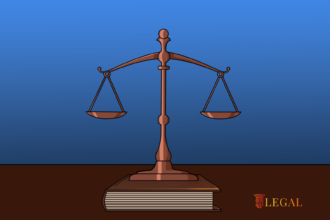
Emmanuel K. Owusu-Asare is a legal practitioner and contributing writer
Published September 30, 2024
Consistently ranked among the best courtroom movies of all time, “My Cousin Vinny”, unhesitatingly attests to a hilarious comedy-drama yet well-crafted courtroom movie that delivers a near perfect depiction of criminal procedure, criminal defense strategy and effective cross-examination.
Directed by Jonathan Lynn and with a cast comprising of Joe Pesci and Merissa Tomei, the movie is about two young college students from New York, Bill Gambini and Stan Rothenstein, who were falsely accused of the murder of an attendant of a convenience shop while enroute to college.
At their wits end and with no money to hire the services of an experienced attorney, they get a lifeline, an inexperienced lawyer who had only made the Bar after a sixth attempt.
When a movie is ranked as number 3 on the list of 25 “Greatest Legal Movies”, by the American Bar Association Journal and for a Chief Judge of the United States Court of Appeals for the District of Columbia, to refer to the movie in the introductory paragraph in a 2019 decision, the enduring quality and relevance of the movie is sealed.
In the following paragraphs, I shall state some of the good qualities about the movie and the lessons they offer for trial strategy, especially for young lawyers in criminal and civil trials:
1. Determination and preparation: Vinny was only six weeks at the Bar when he took on his first case! By all accounts he was inexperienced. Worse, Vinny got thrown into a murder trial with an experienced prosecutor and a no-nonsense judge (in a State other than from which he was qualified to practice in).
The prosecutor was literally thinking that the trial was a foregone conclusion. Initially, Vinny committed some ethical blunders for which he was arrested and detained for contempt but he eventually turned things around through careful examination of evidence, interviewing of witnesses, diligent study of rules and procedure, review of picture evidence relative to impressions found from the actual crime scenes and a real commitment to defending the Accused. In short, the film teaches tenacity and being aggressive in appropriate circumstances to push through the case of your client even when all the odds are against you.
2.The acceptance and humility that we cannot achieve everything by ourselves. Related to the above is the acceptance and humility that we cannot achieve everything or win cases in the courtroom on our own and that sometimes, especially for new and inexperienced lawyers- we may need help and encouragement from colleagues and even from family members.
This was seen in Mona Lisa, Vinny’s fiancé, who did not only assist Vinny with some education on procedural rules- as was seen in telling him that he was entitled under the rules of disclosures to all the documents in possession of the prosecutor but she came through well as expert witness. Her evidence completely rebutted and raised doubts about the testimony of the automotive expert of the prosecution who testified that the tire marks left at the scene of the crime matches the tires of the vehicle driven by the accused persons.
3. The art of forceful, direct and effective cross-examination:
We all know how crucial cross-examination is in a trial; don’t we? It is elementary law that cross-examination is a lawyers mechanism to either dent the witness’ case or advance the cross-examiner’s case or both.
This is manifestly seen in the cross-examination by Vinny of the prosecution witnesses.
At the end of the cross-examination of the 3 prosecution witnesses, it was revealed that the old woman who had sworn to have seen the accused persons from her house couldn’t have been accurate as she had a poor eyesight to have seen the accused persons from 100 yards. Worse, in court she could not count the number of fingers Vinny had raised from 50 yards away using a tape measure. Also the witness who testified to have seen the accused persons leaving the convenience shop could not have seen accurately through a dusty and dirty windows, not helped by trees and bushes in the witness’ point of view from his home.
That witness, Mrs. Riley’s remark that to a question by Vinny that “I’m thinking of getting thicker glasses”, was enough to confirm the unreliability of her testimony and thereby raising a reasonable doubt in the minds of the jury.
The skills and precision of the questions asked by Vinny during the cross-examination of the prosecution witnesses in the movie should serve as a useful template for any young lawyers in criminal trials.

4. Appearance in court is important but can be decorative: Here, the argument goes that since a good appearance makes the best of impressions, it is always important for a lawyer to appear the best in terms of outlook. Ever heard of first impression makes the most impression? that is seen in the movie especially in the initial stages. Vinny was a horribly dressed lawyer. He mostly appeared in coloured suits or a black leather jacket adorn with chains which inevitably drew the ire and censure of the stern and no-nonsense judge. But the appearance of Vinny did not detract from his delivery as counsel as he was spot on the law, the fact and procedure. The all-encompassing lesson therefore is that while a lawyer should properly dress when appearing in court, success is not guaranteed if you are not prepared.
Again, you underestimate another lawyer only by superficial consideration at your risk and that appearance can be deceptive and people should be judged by their substance and demonstrable abilities.
5. Lapses in criminal rules and violation of rights of accused persons at the pre-trial stage:
Most times, innocent persons have been arrested and convicted and sentenced for crimes they did not commit. This conviction could range from the accused person’s lack of appreciation of the criminal proceedings, ignorance of their rights and sometimes for being at the wrong place at the wrong time.
All these are evident in the movie, except for the fact that in this movie the accused persons were at least lucky to have legal representation, even if their lawyer, Vinny, was inexperienced. For example, accused persons were not informed by the police as to the specific offence or crime they had committed at the time of their arrest.
It was why they accidentally gave a confession at the police station because they thought they had been charged with shoplifting at the convenience shop.
Thus Bill Gambini’s question, “I shot the clerk?”, which was essentially to seek for clarification of the reason for their arrest and detention amidst his obvious confusion was understood and misinterpreted by the police ( the sheriff ) as , “I shot the clerk”; a confession to the murder charge.
Conversely, that also raises the issue of the Constitutional right of an accused to remain silent and the risks involved in an accused giving a statement or saying anything during interrogations in the absence of a Counsel.
6. Financial resources of an accused.An accused in a criminal trial does not need to have deep pockets to be acquitted if they are innocent. All they require is a diligent lawyer who will go all out to defend the client; an honest prosecutor who understands that prosecution is not about getting conviction by any means and that the ultimate goal of criminal trial is to ensure justice – seen in the prosecutor unhesitatingly furnishing Vinny with copies of the documents his possession and by his decision to withdraw or even dismiss the charge against the accused persons when circumstances dictated same.
7. Law school education and training are not enough. The real work is in the world of legal practice. In the movie, it happened that after Mona Lisa bails out Vinny, for the second time- for contempt, and apparently unhappy with the performances of Vinny at the trial up to that point, she shot at Vinny as follows;
“Didn’t they teach you that in law school?”
To which Vinny retorted thus;
“No. That’s not what they teach you. They teach you contracts, precedents, interpretations. Then the firm that hires you teaches procedures. Or you could go to court and watch.”
Although Vinny’s assertion may not be wholly accurate as there are many things that law school education provides, however those exchanges are very instructive, especially the response by Vinny: For it shows that more often than not, having a law degree and being called to the Bar alone is not enough. Law school will not teach you everything. The real work starts from legal practice.
The lessons is therefore that, for new lawyers who want to succeed and cut a niche for themselves, they must be diligent, develop practical skills, be innovative, have the skills of legal research and the humility to learn from the accomplished ones at the Bar.
Let me end with the brilliant quotation from the Arabian Night;”the heights that great men reach and kept were not attained by sudden flight. But they, while companions slept, were toiling upward day and night”.
Emmanuel K. Owusu-Asare is a legal practitioner and contributing writer
If you would like to share an article for publication, kindly send to opinions@233legal.com











